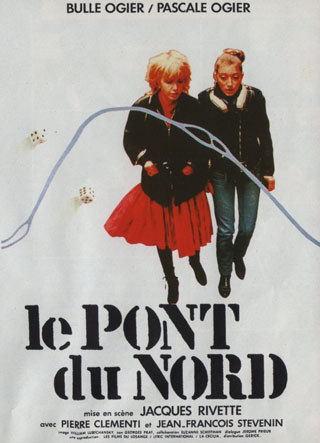“Jacques Rivette had his great period in the 1970s,” writes J. Hoberman at Artinfo, “and Le Pont du Nord, opening for a week at BAM on Friday in a new 35mm print (possibly the first subtitled print shown here since the 1981 New York Film Festival), extends the territory Rivette mapped out in Out 1, Celine and Julie Go Boating, and the rarely-screened Duelle. Like those, Le Pont du Nord uses plein air Paris as the backdrop for a playful, never explained conspiratorial narrative and, in this case, a literal game board (something like Chutes and Ladders) replete with clues and mazes. A ’60s radical (Bulle Ogier) released from prison after serving time for a bank heist wanders through the city as a young woman in a black leather jacket (Pascale Ogier) arrives from the sticks on her motorbike: ‘Bring it on, Babylon,’ she cries in her high-pitched childish voice, combatively circling the plinths and monuments in search of stone lions. The two women literally collide, and then meet twice more before becoming a team, sleeping in parks or an all-night movie house, and meshing their respective paranoid dramas.”
Writing for Film Comment, Max Nelson notes that Rivette’s “favorite obsessions are stamped all over Le Pont du Nord, which tags alongside the two women as they amble around Paris, follow a mysterious map to an uncertain goal, dream up imaginary conspiracies, and run afoul of real ones. There’s fate and chance, of course, but also role-playing and performance, cinema and surveillance, and the thin line between gameplaying and real life…. There has often been a tendency in French cinema to pursue some harmony between the fantastic, idealized world of the movies and the humdrum details of reality—from the New Wave back to the cinéma fantastique of Cocteau, Franju, and Feuillade. Less magicians than hypnotists, these filmmakers pile on narrative coincidences and convince us that they are the result of some unseen order; they portray the impossible not through technological wizardry, but by sheer force of will.”
“Le Pont du Nord was the first feature Rivette directed after the tumultuous 1978 production of Merry-Go-Round, during which he suffered a nervous breakdown,” adds Keith Uhlich in Time Out New York. “The film has the feel of an artist rediscovering his voice.” In the L, Benjamin Mercer finds that “the overall mood is not unlike that of a round of hide-and-seek, in which the stakes might become deliberately confused, stranded somewhere between total lark and deadly seriousness.”
For news and tips throughout the day every day, follow @KeyframeDaily on Twitter and/or the RSS feed. Get Keyframe Daily in your inbox by signing in at fandor.com/daily.




